Past Webinars

Barriers and facilitators of Hispanic/Latino parents caregiving for a childhood cancer survivor: a qualitative study.
Carol Y Ochoa, Ph.D., M.P.H., K00 Awardee
University of California, San Diego
Dr. Carol Ochoa-Dominguez is a Postdoctoral fellow at the University of California San Diego in the Department of Radiation Medicine and Applied Sciences and a Member in Training of the Cancer Control Program at Moores Cancer Center. She is a cancer health disparities researcher; broadly, her research experience has centered on three areas of focus: 1) cancer survivors, 2) informal caregivers, and 3) cancer screening. Within this work, she uses a mixed-method approach to explore whether there are any racial/ethnic differences, the role of social determinants, and specific cultural factors that may be related to these outcomes.
Dr. Ochoa-Dominguez completed her doctoral degree in 2022 from the Department of Population and Public Health Sciences at the University of Southern California, where she was funded by the National Cancer Institute’s T-32 and F99/K00 awards. Before starting her doctorate training, she served as the Cancer Survivorship workgroup ORISE Fellow from 2016-2017 within the Division of Cancer Prevention and Control at the CDC. She also received her MPH in Behavioral Science and Health Education from the Rollins School of Public Health at Emory University in 2016 and her BA from UCLA in 2013.
We extend previous research on Hispanic/Latino caregiver experiences by exploring in-depth the perceived barriers and facilitators of parents in a safety-net clinic who are the primary caregivers throughout their child’s cancer journey. While there have been studies published on Hispanic/Latino caregivers of older adults, there has been little published on identifying the barriers and facilitators of caregiving experiences of parents. Given the intersecting complexities of this safety-net children’s clinic in Los Angeles, which serves primarily Hispanic, recently immigrated, Spanish-speaking, and Medicaid population, it is important to assess whether this vulnerable population has unique barriers and facilitators from previously published literature. Semi-structured phone interviews were conducted among 15 Hispanic/Latino parents caring for their child who was diagnosed with cancer. All interviews were conducted in English or Spanish based on the participant’s language preference. The interviews were recorded using a digital audio device and transcribed by a bilingual professional transcription service. To conserve the meaning of the interviews, they were transcribed and analyzed in the language in which they were conducted. Two bilingual coders independently reviewed transcripts coded them following reflexive thematic analysis and using elements of grounded theory methodology on Dedoose. This study revealed that multilevel factors impact Hispanic/Latino parents’ cancer care management. At the individual level, the magnitude of the caregiving responsibility acted as a barrier, while parents' self-described “relationship with God” acted as a facilitator. Interpersonal relationships, including familial flexibility and fluid roles in relation to caregiving and a positive relationship with the medical care team, were facilitators for caregivers. However, others' perceptions or misconceptions of their child’s illness were a barrier to caregiving. At the organizational and policy level, external financial resources and assistance navigating the application process were beneficial for parents. While issues related to financial hardship and uncertain immigration and citizenship status resulted in caregiver distress and challenges navigating the healthcare system. These findings can guide recommendations to address caregiver burden for this at-risk population at various levels, including suggestions for the healthcare system and policy level.

An integrated isothermal nucleic acid amplification test to detect HPV16 and HPV18 DNA in resource-limited settings.
Kathryn A Kundrod, Ph.D., NCI Cancer Research Training Awardee
National Cancer Institute
Kathryn Kundrod, PhD, MPH is a Cancer Prevention Fellow at the National Cancer Institute (NCI), where she is focused on increasing access to cervical cancer screening with Dr. Philip Castle in the Clinical Genetics Branch of the Division of Cancer Epidemiology and Genetics. Through her fellowship, Dr. Kundrod is currently on rotation with the White House Office of Science and Technology Policy (OSTP), where serves as Senior Advisor for Cancer Moonshot Policy Coordination. Prior to joining NCI, Dr. Kundrod completed a PhD and postdoctoral fellowship in bioengineering at Rice University. During her training, she developed point-of-care HPV tests for early cervical cancer detection in resource-limited settings, as well as a COVID-19 saliva test for use in a surveillance laboratory that she managed. Dr. Kundrod earned a Master of Public Health (MPH) degree from the Harvard T.H. Chan School of Public Health during her Cancer Prevention Fellowship.
Globally, there is an urgent need for low-cost and accessible cervical cancer screening tests. The most sensitive method of cervical cancer screening is testing for high-risk human papillomavirus (HPV) DNA, but current HPV DNA tests are not widely available in resource-limited settings, where the burden of cervical cancer is highest. This talk will outline the recent development of a prototype test that detects two types of HPV DNA – HPV16 and HPV18 – to help meet the need for low-cost cervical cancer screening. The developed test is low-cost, manufacturable, and point-of-care-friendly, enabled by two technologies, isothermal amplification and lateral flow detection, that reduce the cost and complexity of the test. Moreover, the test requires six user steps, produces a result in 45 minutes, and can be performed using small benchtop instruments. In field testing in low- and high-resource settings, the developed test yielded a clinically relevant limit of detection of 1,000 HPV16 or HPV18 DNA copies. Taken together, these results demonstrate the feasibility of an integrated point-of-care HPV DNA test. With the inclusion of additional high-risk HPV types, this test has the potential to meet the need for a point-of-care cervical cancer screening test in resource-limited settings.

Ipilimumab plus decitabine for patients with MDS or AML in posttransplant or transplant-naïve settings.
Jacqueline S Garcia, M.D., K08 Awardee
Dana-Farber Cancer Institute
Dr. Jacqueline S. Garcia is an Assistant Professor of Medicine at Harvard Medical School. She is a clinical/translational investigator in the Adult Leukemia Program at the Dana-Farber Cancer Institute and an attending physician at the Brigham & Women’s Hospital. She graduated from University of Illinois at Chicago College of Medicine and completed her internship and residency training in Internal Medicine at the University of Chicago. She next completed Hematology and Oncology Fellowship training at Stanford University. She joined Dana-Farber in 2015. Dr. Garcia’s research focuses on the design and execution of scientifically based early phase clinical and proof-of-concept studies in advanced myeloid malignancies, including MDS, myelofibrosis and acute myeloid leukemia. Much of her research centers on identifying novel therapeutic opportunities to leverage the anti-apoptotic pathway in chemoresistant leukemia and to address or prevent post-transplant relapse in the context of investigator-initiated trials (IIT). She is a Principal Investigator for several clinical trials, including IIT, ETCTN/CTEP, and pharmaceutical studies. Her research has received support from the National Institutes of Health/National Cancer Institute, Leukemia and Lymphoma Society, and Conquer Cancer Foundation.
Recurrence of acute myeloid leukemia (AML) or myelodysplastic syndromes (MDS) after transplant has exceedingly poor outcome. In a prior study at our center, single agent CTLA-4 checkpoint inhibitor (ipilimumab) generated remissions in cases of AML with low disease burden at relapse with induction of graft-versus-host disease. We asked if we could augment the rate of remission with combination decitabine plus ipilimumab in patients regardless of disease burden and if the alloreactive environment generated after transplant was required for response. In the context of a phase 1 multi-site clinical trial supported by the NCI/ETCTN, we enrolled and treated 48 patients with decitabine/ipilimumab in cohorts separated by transplantation status to assess for safety and preliminary efficacy. We also collected blood/bone marrow from each patient at the same time points before, on-therapy and at time of relapse when relevant to study the local and systemic tumor immune infiltrates. We discovered that immune-related adverse events were frequent and manageable in most patients, the recommended phase 2 dose was the same regardless of transplant status, and we identified responders in both cohorts. Multiplex immunofluorescence (MIF) analyses of paired sequential bone marrows revealed increases in CD4+ T cells after ipilimumab, but we did not consistently observe increases in activated CD8+ T cells among responders. Immune monitoring using Cytof revealed increases in T regulatory cells after ipilimumab but no correlation with response. Transcriptome-based analyses and MIF revealed differences in AML patients with leukemia cutis (skin) compared to those with marrow involvement, including infiltration of memory T cells and higher expression of CTLA-4 and FOXP3. Altogether, detailed immune and molecular correlatives identified potential mechanisms of response and resistance to combination therapy in advanced MDS/AML patients.

Immunotherapeutic Targeting and PET Imaging of DLL3 in Small-Cell Neuroendocrine Prostate Cancer.
Jonathan Chou, M.D., Ph.D., K08 Awardee
University of California, San Francisco
Jonathan is an Assistant Professor of Medicine in the Division of Hematology & Oncology at the University of California, San Francisco (UCSF) and attending physician in the UCSF Genitourinary Medical Oncology program and UCSF Helen Diller Family Comprehensive Cancer Center. His lab research focuses on developing strategies to enhance responses to surface protein targeting therapies, such as antibody-drug conjugates (ADCs), bispecific T cell engagers (BiTEs) and chimeric antigen receptor (CAR) T cells. In addition, Jonathan is interested in understanding resistance mechanisms to surface targeting therapies. Jonathan completed his MD/PhD, residency in Internal Medicine and fellowship in Medical Oncology at UCSF and joined the faculty at UCSF in 2022. Jonathan’s research is supported the Prostate Cancer Foundation (PCF), the Bladder Cancer Advocacy Network (BCAN), the UCSF Benioff Initiative for Prostate Cancer, the DOD Prostate Cancer Research Program and the NCI/NIH.
Surface protein targeting therapies, such as antibody-drug conjugates (ADCs), bispecific T cell engagers (BiTEs) and chimeric antigen receptor (CAR) T cells are an exciting emerging class of cancer therapies. In this talk, we will discuss how to harness these surface proteins to build effective therapeutic and imaging agents, and how to modulate their expression in cancer cells to improve targeting efficacy. Using DLL3 as an example target in small-cell/neuroendocrine prostate cancer (SCNC), we will demonstrate how AMG 757 (tarlatamab), a half-life extended BiTE immunotherapy, redirects CD3-positive T cells to kill DLL3-expressing patient-derived xenografts (PDX) models of SCNC and provide long-term, durable tumor control in mouse models. We will explore how heterogeneity of DLL3 expression impacts response to AMG 757 and provide data on how PET imaging agents may help us with patient selection, as these therapies enter into clinical trials. Finally, we will explore methods to prime tumors and enhance surface protein target expression, which can lead to improved tumor control.
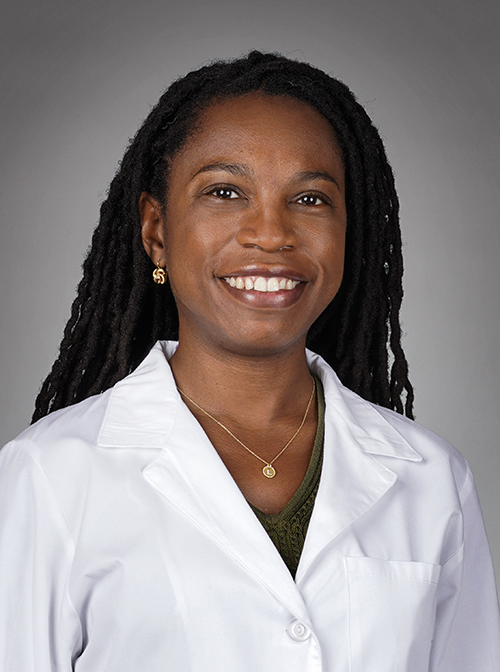
Patient‐reported causes of distress predict disparities in time to evaluation and time to treatment after breast cancer diagnosis.
Oluwadamilola Fayanju, MD, MA, MPHS, FACS, K08 Awardee
University of Pennsylvania
Oluwadamilola “Lola” Fayanju, MD, MA, MPHS, FACS, is the Helen O. Dickens Presidential Associate Professor in the Perelman School of Medicine at the University of Pennsylvania and Chief of the Division of Breast Surgery for Penn Medicine. She is also Surgical Director of the Rena Rowan Breast Center in the Abramson Cancer Center, Director of Health Equity Innovation at the Penn Center for Cancer Care Innovation, and a Senior Fellow in the Leonard Davis Institute of Health Economics. Her research spans four areas: (1) addressing disparities and promoting equity in breast cancer presentation, guideline-concordant care, and outcome; (2) improving prognostication and treatment for biologically aggressive variants of breast cancer including inflammatory, lobular, and metaplastic carcinoma; (3) optimizing oncologic care through the collection and application of patient-reported outcomes (PROs) and data on social determinants of health (SDOH); and (4) elucidating the importance of race, ethnicity, and gender in the conduct of research and the promotion of a diverse healthcare and medical research workforce.
We examined whether the National Comprehensive Cancer Network Distress Thermometer (DT) and Problem List, a patient-reported outcome measure (PROM), could be used to identify levels and causes of distress among women presenting with breast cancer.
We identified women aged ≥18 years with stage 0-IV breast cancer who were diagnosed in a single health system between January 2014 and July 2016. The baseline visit was defined as the first postdiagnosis, pretreatment clinical evaluation. Regression models were used to examine associations between baseline DT score (0 = none to 10 = extreme) and types of stressors (emotional, familial, practical, physical, spiritual) after adjustment for race/ethnicity and other characteristics and to identify predictors of time to evaluation (TTE) and time to treatment (TTT).
A total of 1029 women were included (median baseline DT score = 4). Emotional, physical, and practical stressors were associated with distress (all P < .05). Black patients (n = 258) were >2.5x as likely to report no distress as Whites (n = 675; OR 2.72; 95% CI, 1.68-4.40; P < .001) despite reporting a similar number of stressors. Higher DT scores were associated with shorter TTE and TTT while being Black and having physical or practical stressors were associated with delays in both (all P < .05). Having physical or practical stressors particularly exacerbated delays in TTE and TTT, for Hispanic patients, who represented only a small proportion of our cohort but had the longest delays to evaluation (23 days) and treatment (71 days) of any group and some of the highest median self-reported distress levels.
Early psychosocial evaluation could potentially address delays in time to care and mitigate disparities for vulnerable patients through targeted and culturally responsive interventions for modifiable barriers to care.

Vascular endothelial profilin-1 drives a protumorigenic tumor microenvironment and tumor progression in renal cancer
Dave Gau, PhD, K99/R00 Awardee
University of Pittsburgh
Dr. David Gau is a Lecturer at the University of Pittsburgh, Department of Bioengineering. After earning his Bachelor’s in bioengineering at the University of Pittsburgh, David travelled to Armidale, Australia as a Whitaker Scholar before joining Partha Roy’s laboratory at Pitt for his Ph.D. Following his Ph.D., Dr. Gau continued to work with Dr. Roy for his postdoctoral research and worked on evaluating the role of myocardin-related transcription factor in cancer and his current work on the role of profilin-1 in renal cell carcinoma. Prior to receiving the K99/R00 transition award, David was supported by the National Cancer Center in his postdoctoral training and NSF GRFP in his PhD training. In addition to his research work, David has also earned a certificate in STEM teaching through CIRTL (Center for the Integration of Research, Teaching, and Learning) and micro-credential in leading people in organizations through the Katz Graduate School of Business.
Roughly 80,000 new cases of renal cell carcinoma (or kidney cancer) with estimated 15,000 deaths occur per year. Clear cell renal cell carcinoma is the most common subtype of renal cell carcinoma, accounting for over 75% of kidney cancer cases. Metastatic renal cell carcinoma patients also have a 5-year survival of less than 10% with median survival being around 13 months. A key characteristic of this type of tumor is its highly vascularized tumor microenvironment, meaning that the environment is rich in blood vessels. This is due to loss of a number of genes such as Von-Hippel Lindau, or VHL, which plays a major role in initiation as well as progression of this disease. Outside of surgical removal of the primary tumor, anti-angiogenic therapies such as those targeting VEGF to promote vascular normalization are the first line therapy for renal cell carcinoma patients. Almost all these patients, however, develop resistance and progression of drug-resistant disease. In our recent study, we explored the role of actin-binding protein profilin-1 in regulation of renal cell carcinoma. We show that profilin-1 expression is higher in advanced stage renal cell carcinoma and correlated to lower patient survival. In addition, we note that increased profilin-1 expression is found mainly in tumor-associated vascular endothelial cells (the cells lining blood vessels) in human clear cell renal cell carcinoma patients. We have demonstrated previously that profilin-1 is important for many fundamental cellular processes such as cell migration, proliferation, and angiogenesis (new blood vessel formation). This study shows for the first-time proof of direct causal relationship between vascular endothelial profilin-1 dysregulation, alternations in tumor microenvironment, and disease progression in kidney cancer. This work also further justifies targeting profilin-1 for therapeutic benefit in kidney cancer.
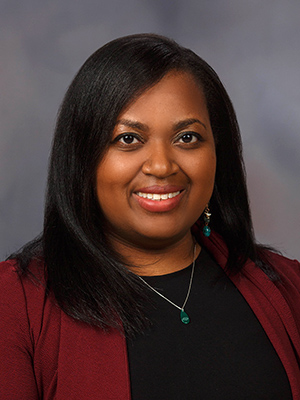
Redlining-associated methylation in breast tumors: the impact of contemporary structural racism on the tumor epigenome
Jasmine M Miller-Kleinhenz, Ph.D., K99/R00 Awardee
Emory University
Jasmine Miller-Kleinhenz, PhD is an Assistant Professor at the University of Mississippi Medical Center. Dr. Miller-Kleinhenz conducts research at the intersection of molecular biology, epigenetics, and epidemiology to investigate the molecular underpinnings of health disparities. The goal of her research is to understand how socio-structural determinants of health “above the skin” influence biological mechanisms “under the skin” and drive cancer disparities. Her research currently focuses on investigating the impact of socio-structural determinants of health on the tumor epigenome as a potential driver of racial disparities in breast cancer. She is particularly interested in investigating the impact of aberrant epigenetic activation of stem cell signaling via exposure to disadvantageous social factors on the etiology of Triple Negative Breast Cancer. Employing her unique expertise in a combination of molecular assays, epigenetic techniques, and epidemiologic methodologies, her research aims to provide new insights into molecular mechanisms that contribute to breast cancer disparities.
As a growing number of studies reveal that racial and ethnic minorities are at an increased risk of developing and dying from various acute and chronic diseases, it is increasingly evident that research must be conducted that will reveal the molecular basis of health disparities. Health inequities often reflect social inequities and exploring the complex relationship between exposures to adverse social factors and their biological consequences is imperative. Our group has shown that place-based measures of structural racism (i.e. redlining) have been associated with an increase in breast cancer mortality. We hypothesized that exposure to adverse inequities may drive epigenetic perturbations that affect racial disparities in breast cancer outcomes. Here, I examined the association between contemporary redlining, a measure of structural racism at the neighborhood level, and DNA methylation in breast tumor tissue. My results showed that contemporary redlining is associated with differential methylation in 5 CpG sites. All genes are implicated in breast carcinogenesis, including genes related to inflammation, immune function, and stress response. Further exploration of the top 25 CpG sites, identified interaction of 2 sites by ER status and 1 site was associated with all-cause mortality. In addition, contemporary redlining is associated with epigenetic age acceleration and age acceleration is slightly associated with all-cause mortality. These results identify novel associations between contemporary redlining and the breast tumor DNA methylome. These data are the first to show that structural racism impacts the breast tumor epigenome and provide a strong foundation for further study into how socio-structural determinants “above the skin” influence biological mechanisms “under the skin” and drive disparities. This work will provide new molecular mechanistic insights governing breast cancer disparities and has broader implications for pharmacological treatments and policy interventions that would contribute to the ultimate goal of achieving health equity.

Evolutionary history of transformation from chronic lymphocytic leukemia to Richter syndrome.
Erin M Parry, MD, PhD, K08 Awardee
Dana-Farber Cancer Institute
Dr. Parry received her undergraduate degree from Colby College and attended Johns Hopkins University School of Medicine where she earned an MD and a PhD. Upon graduation from medical school, Dr. Parry completed residency training in internal medicine at the Johns Hopkins Hospital followed by medical oncology fellowship at Dana-Farber/Partners Cancer Care. During her fellowship, Dr. Parry conducted post-doctoral research in the laboratory of Dr. Catherine Wu on Richter transformation of CLL. She is now an independent investigator at the Dana-Farber Cancer Institute in the Department of Hematologic Neoplasia and Instructor at Harvard Medical School. Dr. Parry's laboratory research currently focuses on the transformation of indolent B cell malignancies to aggressive lymphoma and mechanisms of immune evasion in lymphoma and CLL.
Richter syndrome (RS) evolving from chronic lymphocytic leukemia (CLL) exemplifies an aggressive malignancy that arises from an indolent or chronic cancer. Until recently, little was known about the molecular basis of this transformation from CLL to RS. To identify the genetic events that lead to the transformation of CLL to RS, we examined paired CLL and RS samples from a cohort of 52 patients with RS by whole exome sequencing and applied computational methods to separate out the RS and CLL DNA alterations. Our work uncovered recurrent genetic alterations in RS, including gene mutations, copy number alterations, whole genome doubling and chromothripsis, which was then confirmed in an independent validation cohort. We demonstrated that RS is largely different from DLBCL based on genetics, identified signaling pathways that are dysregulated in RS cells compared to CLL cells, and traced evolution to RS at a single-cell level. Our study identified genetic subtypes within RS and showed that RS DNA alterations can be detected in plasma samples, distinct from blood CLL cells, which may be a potential method for early diagnosis or detection of RS.
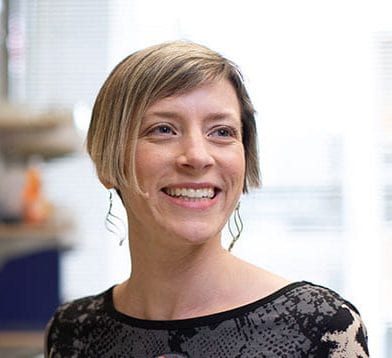
HDAC3 is critical in tumor development and therapeutic resistance in Kras-mutant non-small cell lung cancer.
Lillian J Eichner, Ph.D., K22 Awardee
Northwestern University
Originally from Seattle, Dr. Eichner obtained her undergraduate degree in Chemistry from Northwestern University. She earned her Ph.D. in Biochemistry from McGill University in Montréal, Canada, studying Nuclear Receptor function in cancer with Dr. Vincent Giguère. Her post-doctoral training was carried out with Dr. Reuben Shaw at the Salk Institute for Biological Studies in La Jolla, CA, where she used genetically engineered mouse models to uncover key insights into the in vivo mechanisms driving LKB1-mutant lung tumor biology. She is pleased to rejoin Northwestern University as an independent investigator in the Department of Biochemistry and Molecular Genetics.
HDAC3 is one of the main targets of histone deacetylase (HDAC) inhibitors in clinical development as cancer therapies, yet the in vivo role of HDAC3 in solid tumors is unknown. We identified a critical role for HDAC3 in Kras-mutant lung cancer. Using genetically engineered mouse models (GEMMs), we found that HDAC3 is required for lung tumor growth in vivo. HDAC3 was found to direct and enhance the transcription effects of the lung cancer lineage transcription factor NKX2-1 to mediate expression of a common set of target genes. We identified FGFR1 as a critical previously unidentified target of HDAC3. Leveraging this, we identified that an HDAC3-dependent transcriptional cassette becomes hyperactivated as Kras/LKB1-mutant cells develop resistance to the MEK inhibitor trametinib, and this can be reversed by treatment with the HDAC1/HDAC3 inhibitor entinostat. We found that the combination of entinostat plus trametinib treatment elicits therapeutic benefit in the Kras/LKB1 GEMM.

The Ratio of Key Metabolic Transcripts Is a Predictive Biomarker of Breast Cancer Metastasis to the Lung.
Deepti Mathur, Ph.D., F32 Awardee
Memorial Sloan-Kettering Cancer Center
Dr. Deepti Mathur is a postdoctoral research scholar in the lab of Professor Joao Xavier at Memorial Sloan Kettering Cancer Center, and an associate member in the lab of Professor Nada Kalaany at Boston Children’s Hospital/Harvard Medical School. Upon receiving her undergraduate degree from Cornell University, she joined Professor Ramon Parsons’s lab at Columbia University where she studied the metabolic consequences of PTEN mutations. She now uses a combination of experimental and mathematical models to investigate cancer progression through a metabolic lens. Dr. Mathur has received a Gerry Metastasis and Tumor Ecosystems Center (GMTEC) fellowship, F32 award, AACR Women In Cancer Research award, and was named the 2023 Anthony C. Brown Society Scholar at MSKCC. After her postdoctoral training she hopes to lead a dual experimental-computational research group studying metabolic adaptations in tumors across time and space, and how this can be exploited for predictive diagnostics and future therapeutics.
Breast cancer is a disease marked by cellular diversity. Primary breast tumors can spread to and colonize multiple organ sites, forming metastases. Understanding the factors that drive metastatic tropism and being able to predict metastasis to specific organs a priori remains a challenge. In this study, we investigated how rewired metabolism underlying organ-specific metastasis in breast cancer could help identify strategies to improve the treatment and prevention of metastatic disease. We found that parental breast cancer cells and metastases in the brain and lung each had a distinct, heritable metabolic flux signature. Lung metastatic cells maintained particularly high glycolytic flux by activating a pathway sink into lactate, characterized by a high ratio of lactate dehydrogenase (LDH) to pyruvate dehydrogenase (PDH) gene expression. This elevated LDH/PDH ratio also correlated with lung metastasis in patients with breast cancer. We employed feature classification models on patient data and found that expression of genes taken individually or collectively were unable to predict metastatic tropism. However, the LDH/PDH ratio was a significant predictor of metastasis to the lung specifically. Importantly, alterations of LDH/PDH in the primary tumor in cell lines and patients indicated future lung metastases, such that this ratio was a bona fide predictor. Lung metastases in pancreatic cancer models also exhibited the same metabolic flux alteration, suggesting that lactate production may be a convergent phenotype in lung metastasis across cancer types. Together, these analyses highlight the essential role that metabolism plays in organ-specific cancer metastasis and identify a putative biomarker for predicting lung metastasis in breast cancer patients.

Prospective Evaluation of PI-RADS Version 2.1 for Prostate Cancer Detection and Investigation of Multiparametric MRI-derived Markers.
Enis C Yilmaz, M.D., NCI Cancer Research Training Awardee
National Cancer Institute
Dr. Enis C. Yilmaz is a postdoctoral researcher at the Molecular Imaging Branch, National Cancer Institute, with a particular focus on prostate cancer imaging, MRI/US fusion-guided biopsy, and health disparities in prostate cancer. He earned his medical degree in 2021 on a full scholarship from Bahcesehir University (Istanbul, Türkiye). During his studies, Dr. Yilmaz gained diverse clinical experience through rotations in Italy and Taiwan and engaged in research at Harvard Medical School and UCLA as a visiting researcher. Dr. Yilmaz is investigating AI algorithms to enhance diagnostic accuracy and patient management in prostate cancer under Dr. Baris Turkbey’s guidance. Dr. Yilmaz serves as an Associate Editor on the Radiology In Training Editorial Board, and he is an active member of RSNA, ARRS, ACR, and SAR. Currently pursuing a residency in diagnostic radiology, he aims to combine his research skills with his developing clinical experience as a future physician-scientist.
In our study, we assessed the Prostate Imaging Reporting and Data System (PI-RADS), version 2.1, which is a continually developing and internationally acknowledged MRI-based scoring system used for evaluating the risk of prostate cancer. Conducted between April 2019 and December 2021, our prospective study focused on biological males with suspected or known prostate cancer, aiming to determine the effectiveness of PI-RADS 2.1 in conjunction with MRI features like lesion size, shape, and volume for detecting clinically significant prostate cancer. Apart from assessing the cancer yield in each PI-RADS category, another aspect of our work was to identify more objective, measurable criteria for lesion shape and volume, moving beyond the subjective parameters currently used in PI-RADS. We discovered that the likelihood of identifying clinically significant prostate cancer increases with higher PI-RADS categories and that quantifiable MRI features, such as lesion volume and measure of roundness, are predictors of significant cancer. Our findings also highlight that merging certain subcategories in PI-RADS might result in unnecessary biopsies. In conclusion, our research suggests that incorporating the objective lesion imaging criteria into patient care, alongside PI-RADS scores, could improve diagnostic accuracy. If validated in further studies, these objective measures could potentially be integrated into future iterations of PI-RADS, offering a more precise and reliable approach to prostate cancer detection and reducing unnecessary interventions.
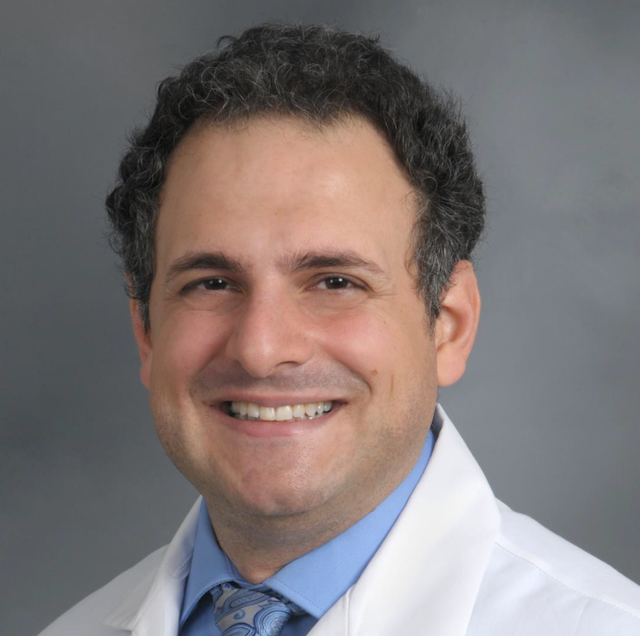
Modeling epigenetic lesions that cause gliomas
Dr. Gilbert J Rahme, K99/R00 Awardee
Dana-Farber Cancer Institute
Gilbert Rahme (pronounced the French way: Jill-bear Ra-hmme) was born and raised in Beirut, Lebanon. After earning a Bachelor's degree at the Lebanese University and a Master's degree in Science at the American University of Beirut, Gilbert joined Mark Israel's laboratory at Dartmouth for his Ph.D., focusing on signaling pathways underlying brain tumor pathology. He then joined Bradley Bernstein's laboratory at Harvard Medical School for his postdoctoral research, focusing on brain tumor epigenetics. Gilbert has been continuously funded by the NCI since his postdoctoral training, receiving both an F32 postdoctoral fellowship and a K99/R00 transition award. Following his latest publication in the journal Cell, Gilbert initiated his own laboratory at Stony Brook University and Cancer Center, where his laboratory focuses on brain tumor epigenetics.
Diffuse gliomas are the most common malignant primary brain tumors and remain incurable despite aggressive multimodal therapies. Understanding the mechanisms by which gliomas arise is a critical step towards improved therapies. Missense mutations in the metabolic enzyme Isocitrate Dehydrogenase 1 (IDH1) drive a subtype of diffuse gliomas with genome-wide DNA hypermethylation, termed the G-CIMP hypermethylator profile. This profile is caused by mutant IDH1 (IDH1mut) enzyme, which produces 2-hydroxyglutarate (2-HG), an oncometabolite inhibitor of the ten-eleven translocation (TET) demethylases. DNA hypermethylation may promote gliomagenesis by silencing tumor suppressor genes or, alternatively, by activating proto-oncogenes through disruption of CCCTC-binding factor (CTCF) insulators. CTCF insulator sites define the three-dimensional shape of the genome by dictating the boundaries of topologically associating domains (TADs). Enhancers and promoters can interact when located in the same TAD but are restricted from interacting across different TADs. In IDH1mut gliomas, CpG dinucleotides around CTCF binding sites are frequently methylated, effectively compromising CTCF binding and thus TAD organization. Importantly, the effects of TAD reorganization on gene expression are contingent on enhancers, which are cell-type specific.
To determine the epigenetic changes that fuel gliomagenesis, we employed a multi-omic approach on clinical IDH1mut glioma samples, leveraging methylation, transcription factor DNA binding, and gene expression analyses. We found a CTCF insulator near the Platelet-derived Growth Factor Receptor A (PDGFRA) proto-oncogene that is recurrently disrupted by methylation. We demonstrate that disruption of the syntenic insulator in mouse oligodendrocyte progenitor cells (OPCs) allows an OPC-specific enhancer to contact and induce Pdgfra, thereby increasing proliferation. We show that a second lesion, methylation-dependent silencing of the Cyclin-dependent Kinase Inhibitor 2A (Cdkn2a) tumor suppressor, cooperates with insulator loss in OPCs. Coordinate inactivation of the Pdgfra insulator and Cdkn2a drives gliomagenesis in vivo. Our study demonstrates the capacity of recurrent epigenetic lesions to drive gliomagenesis.
"Altered propionate metabolism contributes to tumour progression and aggressiveness"
Dr. Ana Gomes, K99/R00 Awardee
Moffitt Cancer Center
Ana P. Gomes is an Assistant Member of the Department of Molecular Oncology at the Moffitt Cancer Center. She received a PhD in Cell and Molecular Biology from the University of Coimbra and did her PhD work under the supervision of Dr. David Sinclair at Harvard Medical School studying the role of NAD+ in skeletal muscle aging. She completed her postdoctoral training with Dr. John Blenis at Weill Cornell Medicine, studying the influence of age-driven metabolic and epigenetic reprogramming in tumor progression. Her laboratory aims to define how aging shapes the tumorigenic process spanning from signaling paradigms to epigenetic reprogramming and metabolic rewiring. Ana has received a Susan G. Komen postdoctoral fellowship, a K99/R00 Pathway to Independence Award, the Tri-Institutional Breakout Prize, an American Cancer Society Scholar Award and was selected as a Forbeck Scholar, a STAT Wunderkind and a Rising Star in Cancer Metabolism and Signaling by the NYAS.
The reprogramming of cellular metabolism for both the development of cancer and its progression to metastasis presents a ripe area of research. Far from simply existing as the process of breakdown and buildup of nutrients in the cell, cellular metabolism has become recognized as a fundamental determinant of cellular identity and function. It is now evident that certain metabolites can drive cancer progression and metastasis, functioning in autocrine, paracrine and endocrine fashions. We have previously demonstrated how a systemic age-induced increase of a single metabolite, contributes to poor cancer prognosis and increased cancer-related mortality in elderly patients, highlighting the importance of metabolic alterations in determining tumor progression. Building on these findings, we have identified that production of this age-related metabolite occurs in cancer cells through deregulation of its biosynthetic pathway and elicits a transcriptional reprogramming that enables cancer cells to attain the traits necessary for progression into metastatic disease.
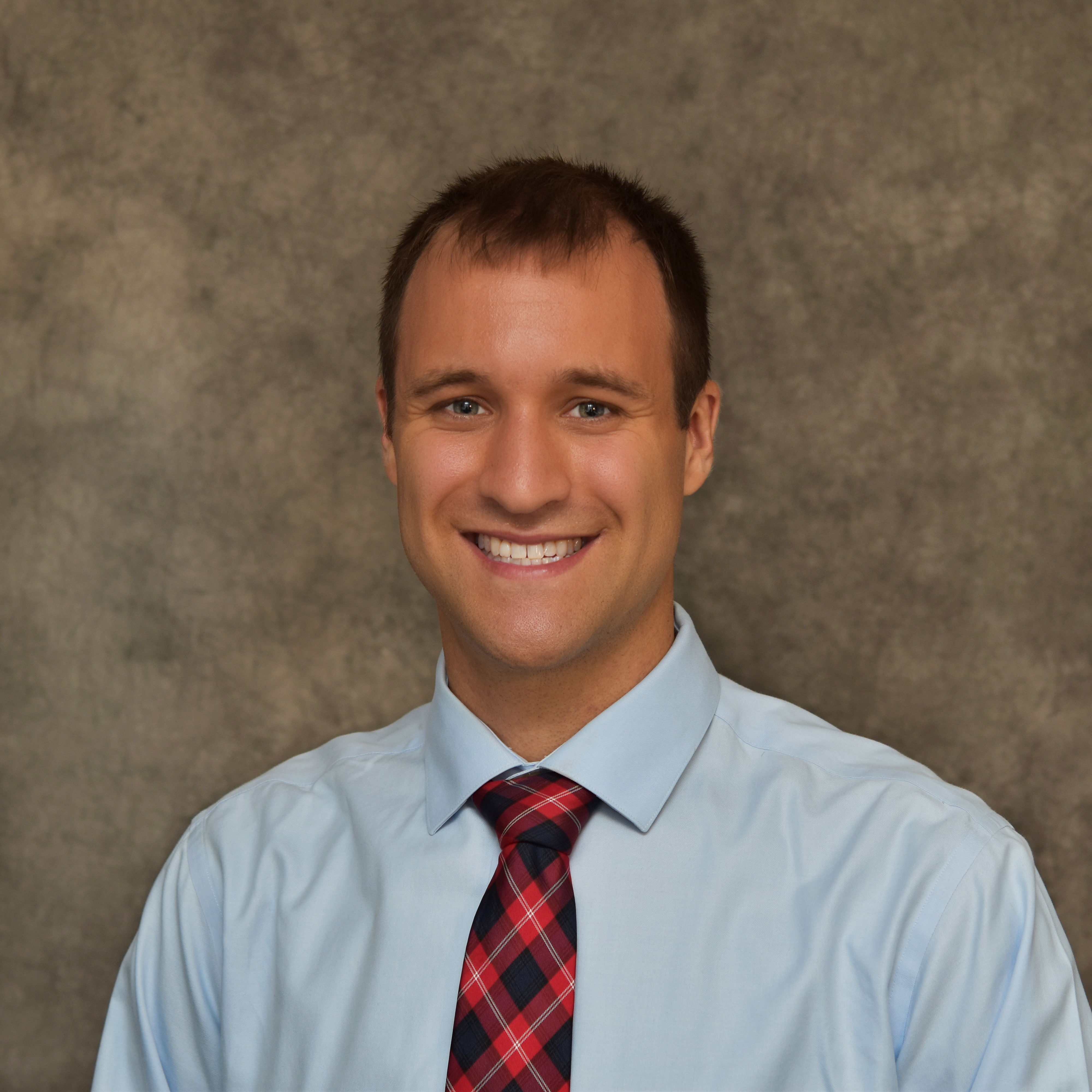
“Chondroitin Sulfate Proteoglycans Are De Facto Cellular Receptors for Human Papillomavirus 16 under High Serum Conditions"
Dr. Nathan Fons, NCI Cancer Research Training Awardee
National Cancer Institute
Dr. Nathan Fons did his undergraduate studies at the University of Wisconsin-Madison and then went on to get a Ph.D. in Experimental Pathology from Yale University. Nathan is currently a postdoctoral research fellow under the mentorship of Dr. John Schiller in the Laboratory of Cellular Oncology at the NCI. His work investigates the binding interactions of human papillomaviruses with host cells and hopes to answer key questions in the field relating to the initial binding and entry receptors for these viruses. Using a variety of approaches including high content microscopy, CRISPR-screening, and bioinformatic tools, this work has implications spanning the fields of basic virology, cell biology, and glycobiology. Expanding on this work, Nathan is also actively involved in the characterization of Belzupacap sarotalocan, an investigational tumor-targeted therapy derived from human papillomavirus capsids, to better define biological signatures mediating its effectiveness.
Heparan sulfate proteoglycans (HSPGs) have previously been identified as the predominant host attachment factors used by human papillomaviruses (HPVs) prior to infection. Here, we demonstrate that in vitro, HPV binding to HSPGs is strongly dependent on the surrounding experimental conditions, including the concentration of fetal bovine serum (FBS). We found that high concentrations of FBS can block HSPG-binding sites and cause a dependence on sulfated chondroitin sulfate proteoglycans (CSPGs) as alternative initial viral receptors. Further, we demonstrate that use of a human-derived alternative to FBS, human platelet lysate, also occludes HSPG-dependent binding, causing a shift toward CSPGs for viral attachment. As HPV infection of basal epithelial cells is thought to occur at sites of microtrauma with exposure to high serum levels and platelet factors, these unexpected findings highlight a possible role for CSPGs as important cellular receptors for the binding and infectivity of HPV in vivo.
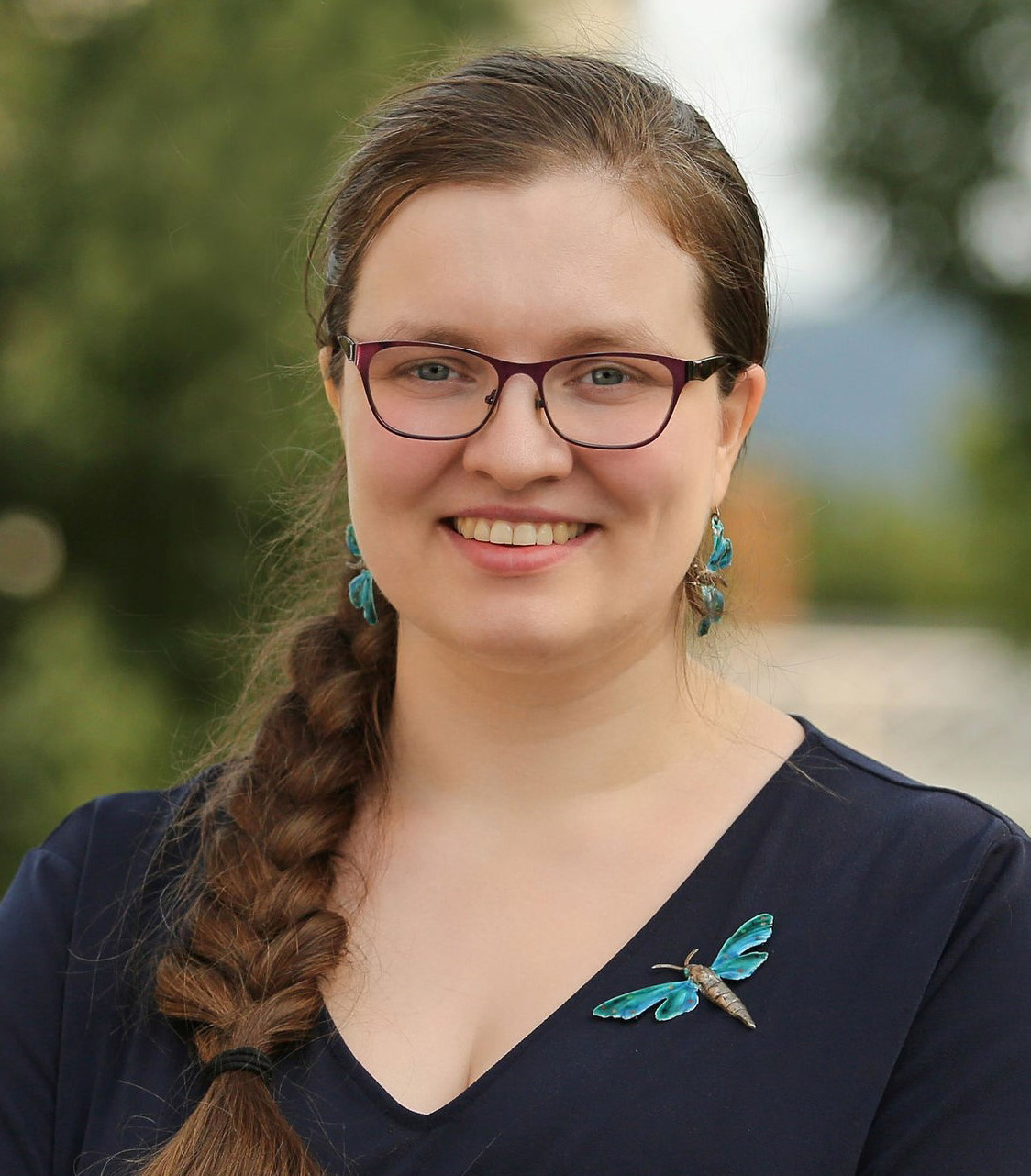
“Distinct MUNC lncRNA structural domains regulate transcription of different promyogenic factors"
Dr. Roza Przanowska, F99/K00 Awardee
University of Virginia
Dr. Róża Kamila Przanowska is a Polish molecular biologist. She obtained Bachelor and Master of Science degrees in biotechnology at University of Warsaw (Warsaw, Poland). She was a Summer Intern in Max Planck Institute (Bad Nauheim, Germany) and a Fulbright Scholar at University of Virginia (Charlottesville, USA). In 2021 she defended her dissertation entitled “Essentiality and functional importance of short and long non-coding RNAs in myogenesis” in the lab of Dr. Anindya Dutta at University of Virginia. During her PhD studies she was awarded among others the American Heart Association Predoctoral Fellowship, Graduate Biosciences Society Student Leadership Award, and F99/K00 NCI Predoctoral to Postdoctoral Fellow Transition Award. She is currently a Research Associate in Dr. Kevin Janes’s laboratory at University of Virginia working on non-coding RNA heterogeneity in breast cancer.
She is married to the Polish molecular biologist and HEMA fencer Dr. Piotr Przanowski. They have three kids.
Long non-coding RNAs (lncRNA) are a type of RNA that is not translated into protein. Many lncRNAs have been discovered using high-throughput sequencing data; however, it is unclear what fraction of them is functional and what structural properties affect their phenotype. One of the lncRNAs important for skeletal muscle differentiation is MUNC acting in cis as an enhancer RNA for the Myod1 gene and in trans by recruiting the cohesin complex. Here, experimental probing of the RNA structure revealed that MUNC contains multiple structural domains not detected by prediction algorithms in the absence of experimental information. We show that these specific and structurally distinct domains are required for induction of muscle-related genes, for binding genomic sites and gene expression regulation, and for binding the cohesin complex. Our study reveals unexpectedly complex, structure-driven functions for the MUNC and emphasizes the importance of experimentally determined structures for understanding structure-function relationships in lncRNAs.
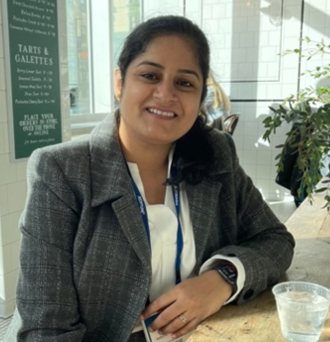
“Immune cell gene expression signatures in diffuse glioma are associated with IDH mutation status, patient outcome and malignant cell state, and highlight the importance of specific cell subsets in glioma biology”
Dr. Bharati Mehani, NCI Cancer Research Training Awardee
National Cancer Institute
Bharati Mehani, PhD is a senior Postdoctoral Fellow at NCI, NIH. She was first introduced to the amazing field of bioinformatics and its application in science in 2011 when she joined her masters at BHU, Varanasi, and there has been no going back since then. She received her early training at Dr. Mukhopadhyay’s lab in 2011 at IGIB, New Delhi, India where she joined his group as a Project Assistant to study comparative genomics using spectrum of CNVs, somatic mosaicism and non-coding RNAs in human brain. In 2014, she enrolled for Ph.D. program at the same lab where her research interest was to study transcriptomics changes in human brain mediated by fusion transcripts and RNA editing. In December 2018, she joined Dr. Aldape’s lab at NCI as a visiting fellow to investigate the regulatory landscape of gliomas by integrating single cell RNA Seq with deconvolved bulk tumors and other multi-omics.
This presentation will discuss the biological and clinical significance of the immune cell environment related to IDH mutation status, patient prognosis and the mesenchymal state in diffuse gliomas.
The tumor micro-environment (TME) plays critical role in various cancers, including gliomas. We estimated immune cell type-specific gene expression profiles in glioma datasets and found estimated proportions and gene expression profiles that varied according to IDH mutation status. Cluster-of-cluster analyses of immune cell gene expression identified groups with distinct survival outcomes in IDH-WT and IDH-MUT tumors. We verified these findings by applying a signature matrix derived from single-cell RNA Seq data. To link immune cell signatures with outcomes in checkpoint therapy, we found a significant association of monocytic gene expression clusters with patient survival and with mesenchymal scores. Integrating immune cell-based gene expressions with previously described malignant cell states in glioma demonstrated that macrophage M0 abundance significantly correlated with mesenchymal state in IDH-WT gliomas. Overall, these results highlight biological and clinical significance of immune cell environment related to IDH mutation status, patient prognosis and the mesenchymal state in diffuse gliomas.
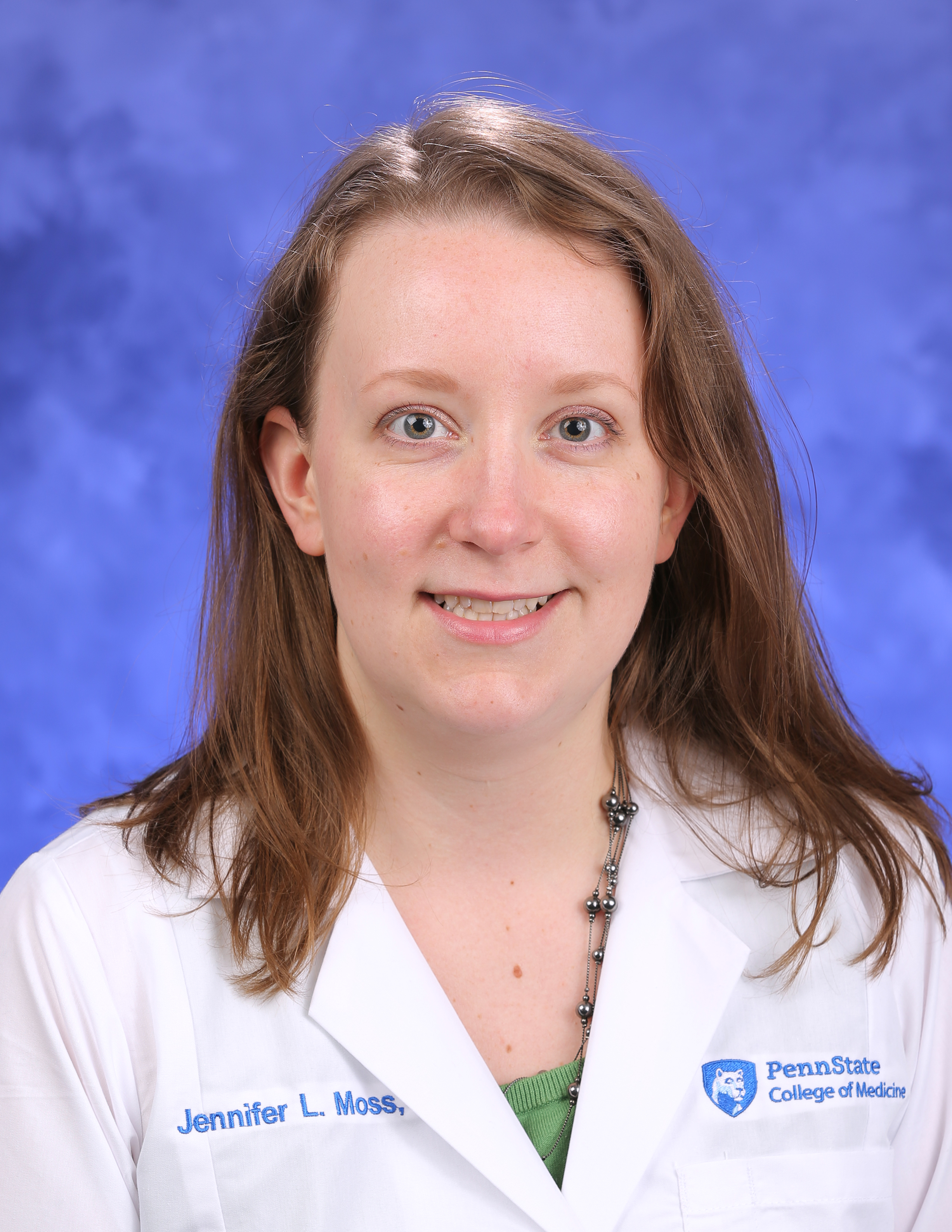
"Enduring, Intersectional Cancer Mortality Disparities in Persistent Poverty Counties"
Dr. Jennifer Moss, K22 Awardee
Penn State College of Medicine
Jennifer Moss, PhD, is an Assistant Professor in the Departments of Family and Community Medicine and Public Health Sciences at Penn State College of Medicine. She also serves as Assistant Director of Data and Analysis in the Office of Cancer Health Equity at the Penn State Cancer Institute. Dr. Moss received her PhD in Health Behavior at the University of North Carolina, Chapel Hill, and she served as a post-doctoral Cancer Prevention Fellow at the National Cancer Institute. Dr. Moss is a social and behavioral scientist focused on geographic disparities in the cancer control continuum. Her work examines aspects of the social and built environment that impact health and healthcare outcomes relevant to cancer, with a special interest in underserved and rural communities. Dr. Moss has published more than 60 peer-reviewed manuscripts and has an extensive history of teaching and service.
Counties with higher levels of poverty since 1980 (“persistent poverty”) tend to be rural and racially diverse, but it is not clear how poverty, rurality, and race work together to influence trends in cancer mortality. We analyzed cancer deaths from 1990-1992 and 2014-2018. During each time period, compared to other counties, persistent poverty counties had about 12 excess cancer deaths per 100,000 people per year (1990-1992: 12.7, 95% confidence interval[CI]=11.4-14.1; 2014-2018: 11.0, 95% CI=10.2-11.8). Over time, disparities by persistent poverty widened for colorectal and breast cancers, but they were stable or mixed for the remaining cancer types. The highest mortality rates were observed among African American or Black residents of rural, persistent poverty counties for colorectal, oropharyngeal, breast, cervical, and prostate cancers. Since several factors influence cancer mortality, a multi-faceted approach is needed to improve outcomes in persistent poverty counties.

"Are beliefs about the importance of genetics for cancer prevention and early detection associated with high risk cancer genetic testing in the U.S. Population?"
Dr. Sukh Makhnoon, K99/R00 Awardee
University of Texas Southwestern Medical Center
Sukh Makhnoon is an Assistant Professor at the Peter O’Donnell School of Public Health and Simmons Comprehensive Cancer Center at UT Southwestern Medical Center. Dr. Makhnoon is a genetic epidemiologist who focuses on public health genomics and the translation of genomic applications into clinical practice. Her research uses genetics, behavioral science, epidemiology, health services, and clinical perspectives to improve utilization of cancer prevention and control innovations across the cancer continuum, with a focus on uncertain and reclassified genetic test results. Her research interests include uncertainty related to genomic sequencing, genomic variant reclassification, and patients’ experiences with genomic sequencing. Prior to joining UTSW, Dr. Makhnoon was a postdoctoral fellow at UT MD Anderson Cancer Center in the Division of Cancer Prevention and Population Sciences. She received her PhD in Public Health Genetics and MS in Genetic Epidemiology from the University of Washington in Seattle.
Public attitudes towards germline genetic testing for inherited cancers have been found to be generally positive. We know that diverse causal beliefs about cancer and sociodemographic factors are associated with uptake of cancer genetic testing. However, it is unclear how beliefs about genetically informed cancer prevention and genetically informed early detection of cancer shape testing behaviors. Using data from the National Health Information National Trends Survey, we studied this relationship between belief about cancer genetics and participation in cancer genetic testing. Interestingly, we find that belief in the importance of genetics for early detection of cancer was associated with testing however, belief in the importance of genetics for cancer prevention was not. The pattern of association is a surprising finding that warrants further investigation as better understanding cancer prevention beliefs and their impact on genetic test uptake may inform population genetic testing efforts.
"Site-specific regulation of translation initiation through RNA modifications"
Dr. Daniel Arango, K99/R00 Awardee
Northwestern University, Feinberg School of Medicine
Dr. Daniel Arango is an Assistant Professor in the Department of Pharmacology and the Robert H. Lurie Comprehensive Cancer Center at Northwestern University. His research program investigates how chemical modifications of RNA regulate protein synthesis and how this interplay affects cell fate decisions such as cell proliferation, cell differentiation, and cell death in cancer. Dr. Arango received a B.S. in Biology from Universidad de Antioquia – Colombia, obtained a Ph.D. in Molecular Biology from The Ohio State University, and conducted postdoctoral training in RNA biology at the U.S. National Cancer Institute.
The Arango lab works to unravel the molecular mechanisms by which post-transcriptional modifications of RNA regulate mRNA processing, stability, and translation and how this interplay affects cell fate decisions in homeostasis and disease. With more than 150 ribonucleotide modifications in all classes of RNA, the epitranscriptome has become a crucial regulatory layer of gene expression regulation. Although the vast diversity of RNA modifications entails an immense regulatory potential, deciphering the epitranscriptome is an enormous scientific challenge. Yet, its decryption will reveal fundamental aspects of gene expression regulation during normal metabolism and disease, which can potentially be leveraged for therapeutic applications. This seminar will focus on our recent findings that acetylation of cytidines in RNA regulates translation in a position-specific manner and the Arango’s laboratory ongoing studies to determine the mechanisms by which the RNA acetyltransferase complexes promote cell proliferation and cancer growth.
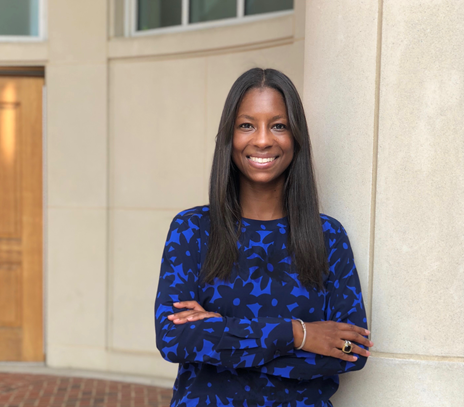
"Utilizing Multiple Strategies to Advance Equitable Implementation of Lung Cancer Screening: Implications of Varying Eligibility Criteria by Race and Ethnicity"
Dr. Randi Williams, K99/R00 Awardee
Georgetown University
Randi M. Williams, PhD, MPH is an Assistant Professor in the Department of Oncology and a member of the Cancer Prevention and Control Program within the Lombardi Comprehensive Cancer Center at Georgetown University Medical Center. Her research focuses on methods to promote the adoption of evidence-based lung cancer control practices to advance health equity.
Dr. Williams’s research utilizes multilevel approaches to promote equitable care within the healthcare setting. In her ongoing National Cancer Institute-funded K99/R00, Dr. Williams is targeting provider and patient behavior to promote patient-provider communication about lung cancer screening and to advance equity in screening rates between Black and White patients.
Dr. Williams completed her postdoctoral fellowship at Lombardi under a Diversity Supplement. She received her PhD from the University of Maryland, College Park, School of Public Health, her MPH in behavioral sciences and health education from Emory University and a BA degree in psychology from Syracuse University.
In 2013, lung cancer screening (lung screening) was recommended for high-risk individuals. The annual rate of lung screening has risen slowly, particularly among Black individuals. In part, this racial disparity resulted in expanded 2021 screening criteria. Methods: Survey data were used to: 1) describe the number of people screened in 2019, 2) compare the percent eligible for lung screening using the 2013 versus the 2021 guidelines, and 3) determine the percent eligible using more detailed criteria. Results: Lung screening rates increased in 2019, and the 2021 criteria will result in more individuals eligible for screening. Using additional criteria may identify more individuals eligible for lung screening. Conclusions: This presentation will discuss ways to include more individuals who may benefit from lung screening and other strategies that can improve screening rates in an equitable manner

Experiences of Racially/Ethnically Diverse Young Breast Cancer Survivors: Preliminary Survey Observations
Dr. Tarsha Jones, K01 Awardee
Florida Atlantic University
Tarsha Jones, PhD, MSN, RN, PHNA-BC, is an Assistant Professor of Nursing at Florida Atlantic University. She obtained a Bachelor’s of Science in Nursing Degree from Seton Hall University, a Master’s of Science in Community/Public Health Nursing from the Catholic University of America, with a specialization in immigrants, refugees, and global health. She is a board certified advanced public health nurse (PHNA-BC). She obtained a Doctor of Philosophy (PhD) in Nursing degree from Duquesne University and completed a post-doctoral research fellowship at Dana Farber Cancer Institute and Harvard Medical School. Dr. Jones’s research focuses on breast cancer prevention and control and reducing cancer health disparities. She has been a champion for vulnerable underserved populations and promoting health equity. Dr. Jones is a member of Sigma, an International Nursing Honor Society and the International Nursing CASCADE Consortium.
This presentation will discuss preliminary observations from a survey of diverse young breast cancer survivors.

"Exploring the Role of Masculine Role Norms, Medical Mistrust, and Normative Support on Colorectal Cancer Screening Uptake among African-American Men"
Dr. Charles R. Rogers, K01 Awardee
Medical College of Wisconsin
Dr. Charles R. Rogers is an Associate Professor in the Institute for Health & Equity at the Medical College of Wisconsin (MCW), an MCW Cancer Center Research Scholar Endowed Chair, and the inaugural Associate Director of Community Outreach & Engagement at MCW’s Cancer Center. He is also the Founding Director of his Men’s Health Inequities Research Lab and an Associate Member of the University of Michigan Mixed Methods Program. He is committed to dismantling systems of oppression to ensure equitable health for all. His transdisciplinary training in applied mathematics and statistics, health education, public health administration and policy, community-based participatory research, and cancer-related health disparities provides a unique perspective on translating research findings into effective approaches to disease prevention. For more than 20 years, Dr. Rogers has shared his knowledge across the world and via numerous media outlets. To learn more, visit crrogersPhD.com or follow Dr. Rogers on Twitter: @crrogersPhD.
Among all racial and ethnic groups, African-American men are the most likely to get colorectal cancer (CRC) and to die of it. Screening can prevent CRC and save lives, but few African-American men receive a CRC screening test. This study recruited English-speaking African-American men aged 45 to 75 into focus groups to examine how their attitudes, beliefs, and life circumstances affected their likelihood of getting a CRC screening test. These focus groups revealed two important barriers for these African-American men to getting screened for CRC: the way they thought about the social expectations of being a man and their mistrust of doctors. The researchers concluded that healthcare professionals need to find ways to address these barriers when they develop programs aimed at encouraging African-American men to get screened for CRC.
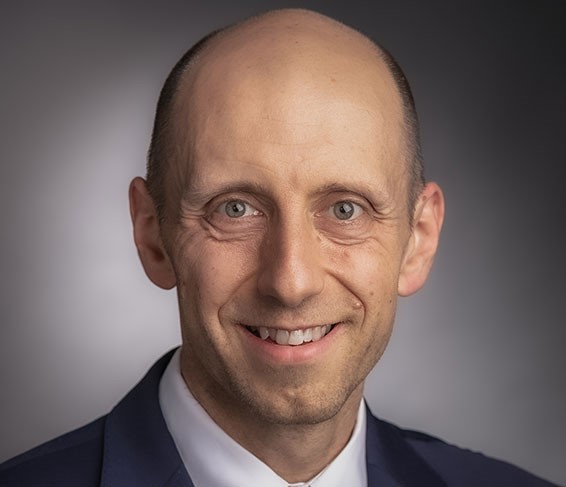
"Donor Clonal Hematopoiesis and Recipient Outcomes After Transplantation"
Dr. Chris Gibson, K08 Awardee
Dana-Farber Cancer Institute
Dr. Chris Gibson graduated from Yale University School of Medicine in 2009 and trained in internal medicine at Brigham and Women's Hospital, where he was also chief medical resident. He completed his oncology and hematology fellowships at Dana-Farber Cancer Institute in 2017. His research focuses on how genetic mutations in the blood cells of bone marrow transplant donors and recipients affect recipient outcomes.
Clonal hematopoiesis (CH) can be transmitted from a donor to a recipient during allogeneic hematopoietic cell transplantation. Exclusion of candidate donors with CH is controversial since its impact on recipient outcomes and graft alloimmune function is uncertain. We performed targeted error-corrected sequencing on samples from 1,727 donors age 40 years or older and assessed the effect of donor CH on recipient clinical outcomes. We measured long-term engraftment of 102 donor clones and cytokine levels in 256 recipients at 3 and 12 months after transplant. We found that donor CH is closely associated with clinical outcomes in transplant recipients, with differential impact on graft alloimmune function and potential for leukemic transformation related to mutated gene and somatic clonal abundance. Donor DNMT3A-CH is associated with improved recipient survival because of reduced relapse risk and with an augmented network of inflammatory cytokines in recipients. Risk of donor cell leukemia in allogeneic hematopoietic cell transplantation is driven by somatic myelodysplastic syndrome–associated mutations or germline predisposition in donors.

"The Spatial Landscape of Progression and Immunoediting in Primary Melanoma at Single-Cell Resolution"
Dr. Ajit Johnson Nirmal, K99/R00 Awardee
Harvard University
Dr. Ajit Johnson Nirmal is a postdoctoral fellow with Dr. Peter Sorger and Dr. David Weinstock at the Harvard Medical School and Dana Farber Cancer Institute. Dr. Nirmal studies the role of tumor microenvironment in tumor development and drug resistance. By computational integration of highly multiplexed imaging data with omics data, Dr. Nirmal aims to decipher regulatory circuits that underlie cancer development and drug resistance, with a goal of building dynamic personalized medicine frameworks that will generate clinically actionable therapeutic insights for individual patients.
Melanoma is a type of skin cancer that can be cured if caught early but can be life-threatening if it spreads. In this study, we used a combination of imaging and sequencing technology to study how melanoma interacts with its microenvironment. We found that the organization of cancer cells, immune cells, and other cells in the body changes as melanoma progresses. In early stages, there are signs that the immune system is being suppressed. When melanoma becomes invasive, specific areas form where the immune system is suppressed, and cancer cells can grow and spread. However, a short distance away, there are also areas where the immune system fights cancer. This shows that cancer and the immune system can coexist and evolve together. This type of study helps understand how cancer can avoid being destroyed by the immune system.